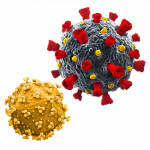In the wake of the COVID-19 pandemic, with nations beginning phases of reopening—some quicker than others—one could pose the question “What happens now?” Or rather, “What have we learned and will continue to learn from this experience?”
One thing for sure is that the United States has had one of the worst responses to COVID-19 and is leading in the number of cases and deaths across the globe. However, is this a surprise, given the historically negligent response by the United States to other viruses, which I assert through the expression “viral hysteria” (the sociopolitical reaction to viruses)?
The reality is, the United States was never ready to handle such a fast-spreading pathogen as SARS-CoV-2, the novel coronavirus that causes COVID-19. This is especially true, given the current administration has systematically rejected the role of science to inform policy. One could also argue American arrogance is playing a major role in the wide range of domestic responses to COVID-19 in comparison to other nations.
The current response to COVID-19 is a direct result of the global activism and conversation that has already existed around HIV/AIDS, as well as preventive measures like pre-exposure prophylaxis (PrEP), post-exposure prophylaxis (PEP) and Undetectable Equals Untransmittable (U=U).
As a person living with HIV who has an undetectable viral load, I find myself not only thriving in the wake of the COVID-19 pandemic but also feeling slightly puzzled more often than not by the language surrounding this virus.
This is a result of my internal processing of how to respond when I’m asked the question “Have you tested positive yet?” Ultimately, I’m left feeling unsure what to mention.
Are you asking about the HIV that I contracted in August 2016? Or are you asking me whether I tested positive for COVID-19? That I have evidently survived the new coronavirus, developed antibodies and can now hang out, hike, do brunch, attend a trendy protest for Black Lives Matter or rightfully show solidarity for my Black transgender sisters by joining them in Brooklyn to scream “Black Trans Lives Matter” at the top of our lungs?
Nevertheless, I find myself sequestered in my room because I need to work from home in order to earn an income for rent to have a roof over my head and maintain my insurance and access to lifesaving medication.
Or do I risk eviction by joining the rent strike because we know housing insecurity has always been a reality for queer bodies, as has an inability to access insurance to afford the monthly cost of HIV medication? Without these, what are my chances of living?
At what cost am I willing to stay alive? Because when I’m asked the question “Have you tested positive yet?” I experience anxiety and a loss for words, except for the mental rhetorical response “Positive for what?” Because shame has always existed around a positive HIV status.
If people are not willing to wear a mask to avoid spreading the new coronavirus, what makes us think people will wear a condom? Or let alone take preventive HIV medication that comes with a high cost and a round of pharmaceutical games? Or face the reality of having a positive diagnosis for a virus the world isn’t prepared for—be it HIV or SARS-CoV-2?
Is this naiveté a direct result of the way COVID-19 is disproportionately impacting low-income communities of color? Similar to how HIV and AIDS have historically affected these communities as well? And is this why the Trump administration is turning a blind eye to COVID-19? Because we all know—especially those of us living with HIV in the now—that we are fighting to live in a for-profit health care system.







Comments
Comments